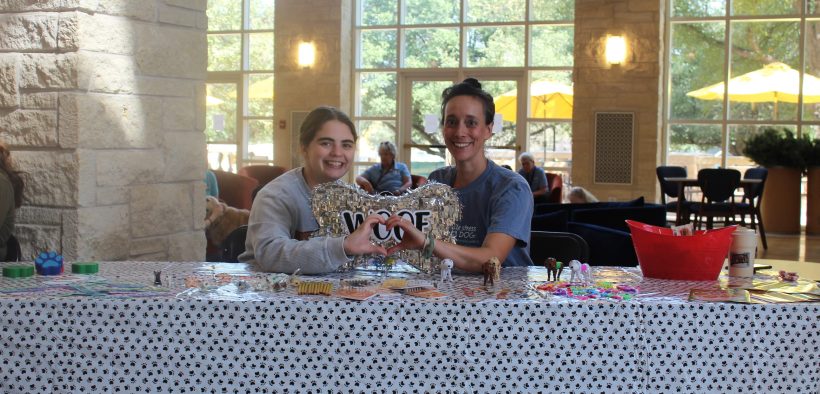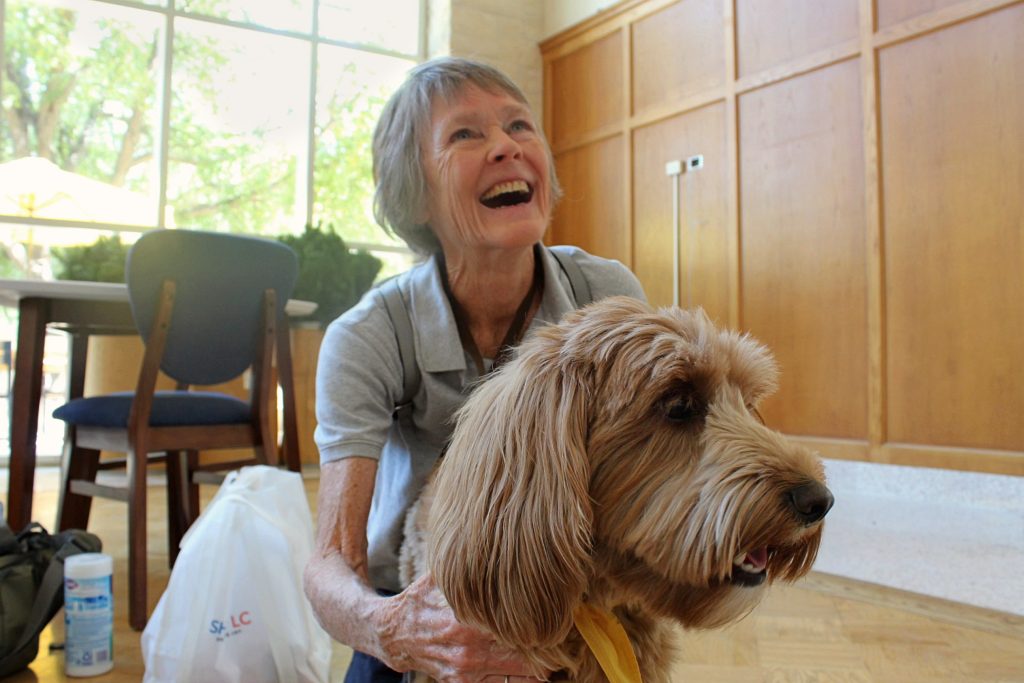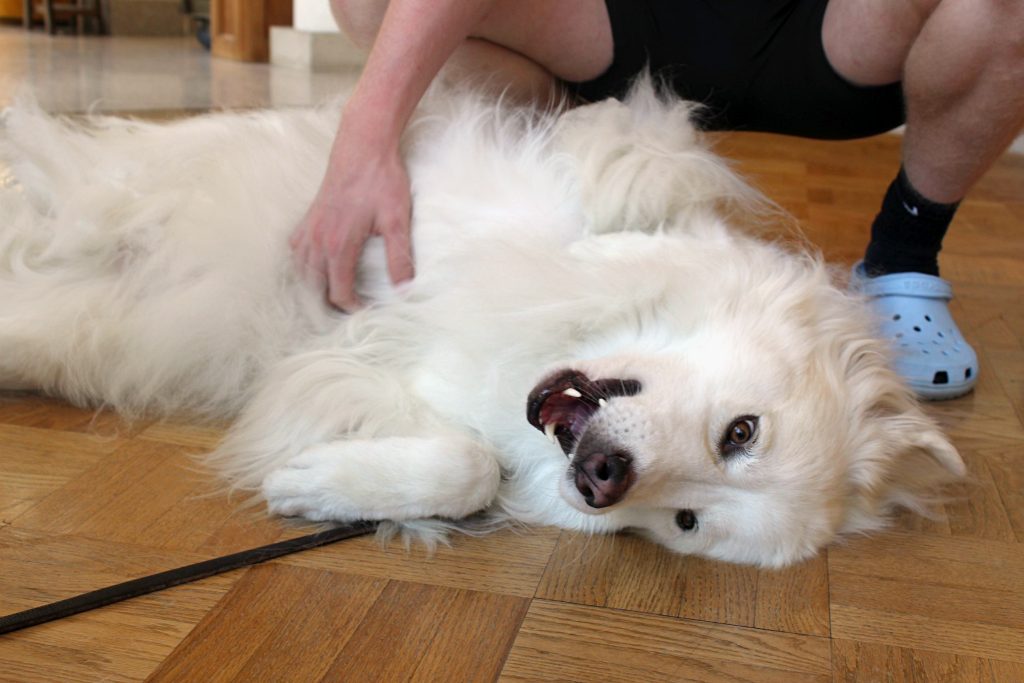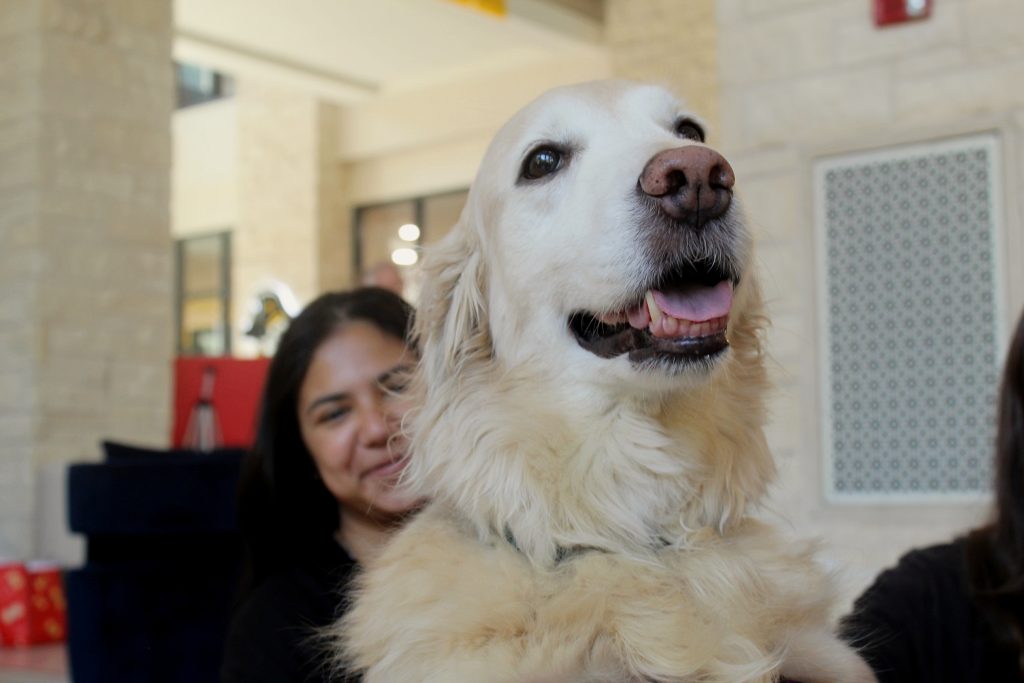Barktastic Bonds: ‘Pet Partners’ Brings Therapy Dogs to Southwestern!
Share

On various weekdays throughout the semester, students walking through McCombs Commons might encounter friendly furry faces waiting to greet them. Bishops Lounge grows easily crowded on days the organization Pet Partners surprises students with a visit. Handlers associated with Pet Partners bring their extensively trained dogs to campus for interaction with Southwestern students. But the interactions aren’t just for fun – they also provide health benefits for college students. Pet Partner’s mission is to improve human health and well-being through the human-animal bond, a mutually beneficial relationship that improves lives physically, mentally, and emotionally. Some benefits of playing with and petting dogs and other animals include: reducing anxiety and cortisol levels, promoting the release of serotonin, lowering blood pressure, and providing comfort and support.
On Tuesday, October 8, 2024, the Megaphone interviewed the dogs and handlers present at the latest Pet Partners event, which was organized with the help of Dr. Vanessa Mikan in the Kinesiology Department. Readers, meet the volunteers that make these special events on campus possible!
Puppy Profiles:
Name: Zeke
Handler: Barbara
Breed: Australian Shepherd / Labrador Mix
Age: 3 years old
Personality: Very laid back, easy-going and calm
Award: Best dressed in his pumpkin bandana

Name: Rudy
Handler: Nancy
Breed: Golden Doodle
Age: 4 years old
Personality: Very friendly, bouncy and energetic
Award: Best first day on the job!

Name: Zain
Handler: Susan
Breed: Great Pyrenees
Age: 4 years old
Personality: Sleepy, gentle
Award: Most prepared for snow (Zain has double dew claws!)

Name: Magnolia
Handler: Ladye
Breed: Golden Retriever
Age: 8 years old
Personality: Sweet, friendly and magnetic
Award: Most charismatic (and best big sister at home!)

Handlers working with Pet Partners have gotten involved in the organization through various avenues. Susan, Zain’s handler, used to work with therapy dogs outside of Texas in hospitals and parks, in the absence of an organization like Pet Partners. Certification processes vary widely from state to state, Susan suggested Canine Angels as another alternative program that does similar work in the U.S. Nancy, Rudy’s handler, worked with Pet Partners 15 years ago with a different dog, and after a break for a time, she decided she truly missed the work that Pet Partners does, and she started training Rudy. The day of this interview was Rudy’s first day on the job!
To become a therapy dog, prospective candidates need to take aptitude tests first to see if they have the potential to work as therapy animals. After extensive preparatory training at the beginning, intermediate, and advanced levels, dogs like Zeke, Zain, Rudy, and Magnolia are required to take the Canine Good Citizen test administered by the American Kennel Club – it’s like the MCATs but for dogs. Passing their exams with flying colors is imperative if these dogs are to begin working as therapy animals (college students, does this sound familiar?). Not only do the dogs have to perform well, but their handlers must also make high scores on the final exam. Ladye explained in more detail what could happen in the CGC test: “They test to see if the dogs will react to sudden movements, and they give them noise stimulation, like dropping a pan on the floor in a different room. They also bring other untrained dogs in to see how the dog who’s undergone pet therapy training will react while it’s ‘working,’ because once these dogs go through the right training, they’re similar to service animals in that respect.” After this certification, the dogs can finally enter spaces like elementary schools, hospitals, and rehab centers to visit with people. It is important to note that they must be recertified every two years. Susan shared a reminder that no matter how much official training the dogs have gone through, “you’re still training, always. It’s a lifetime process.”
In addition to visiting Southwestern, Pet Partners provides visits with therapy animals at all kinds of various locations. One of Zeke’s favorite places to visit is elementary schools, where he helps the children read during story time. Magnolia is a regular at St. David’s Children’s Hospital and often visits memory care units and elementary schools. When the therapy dogs work with younger children at the schools, it helps calm them down. Barbara recalled one instance where Zeke was visiting children at an elementary school, and one little girl consistently refused to speak in school because she was afraid to. However, upon meeting and interacting with Zeke, the time she spent with him helped ease her anxiety to such a degree that she finally felt comfortable opening up and she started talking.
When the Pet Partners dogs and handlers visit Southwestern, while that calming presence that the dogs provide is still certainly in effect, students on campus are much more visibly excited to spend time with Zeke, Zain, Rudy, and Magnolia, along with other therapy dogs that frequent the University. Susan noted the kinds of reactions she sees always include “lots of smiles,” and many students after their initial excitement often appear calmer and more relaxed. Visiting with the therapy dogs has proved to be a good release of tension for students amid stress surrounding school, work, extra-curriculars, and life. Susan also asserted that “for freshmen, it’s a super helpful experience. It’s good for college students that just arrived on campus because maybe they’re missing their family pet at home.” Ladye echoed similar sentiments, saying “I just see smiles when Magnolia greets people. And when we visit rehab centers and hospitals, Magnolia just gets so excited to greet literally each and every person in the room, she’s really special in that way. We just need more smiles.”
Nancy summarized by saying “Dogs are good for us, they’re calming and relaxing.” Ladye reflected that the handlers’ work at Pet Partners is a way to give back to the community. Barbara claims she’s not a dog lover, but Zeke brings a kind of joy that’s just different: “It’s very rewarding. Zeke’s a therapy dog for me too.” The joy on Susan’s face was undeniable when she said “They just give you unconditional love.” The handlers at Pet Partners have a deep and precious bond with their dogs, and it is an immeasurable treasure when handlers choose to volunteer and share the comfort and peace their furry friends provide with Southwestern students.
